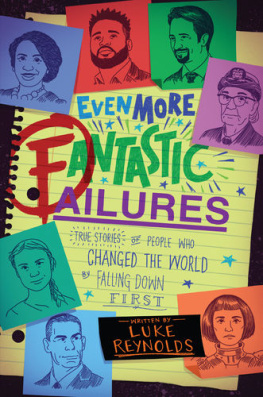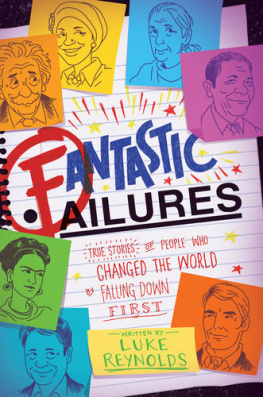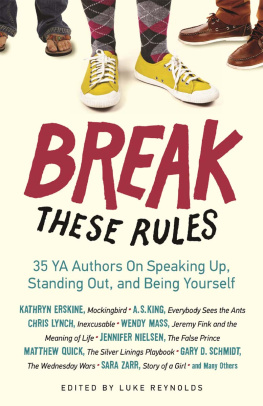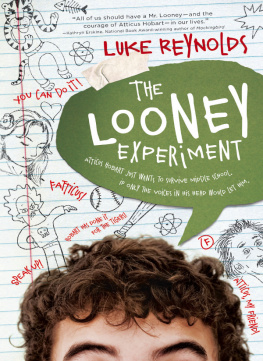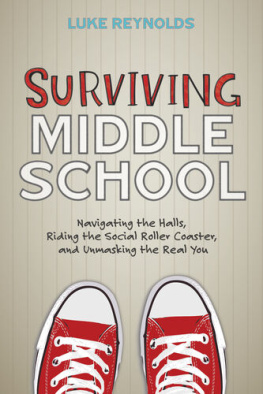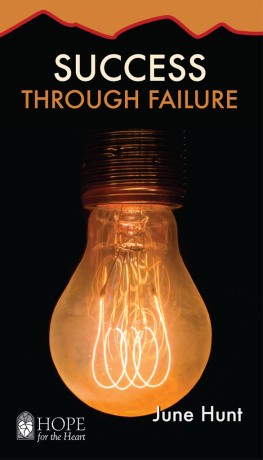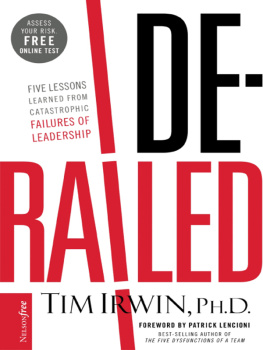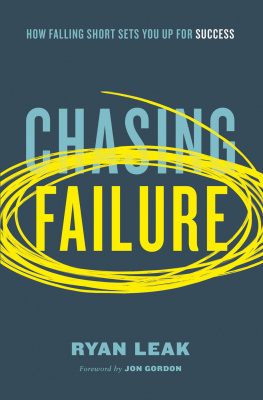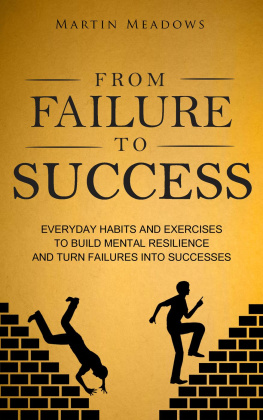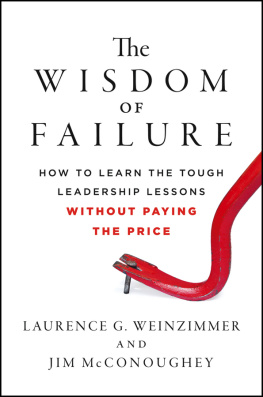
ALADDIN
An imprint of Simon & Schuster
Childrens Publishing Division
1230 Avenue of the Americas
New York, NY 10020
www.SimonandSchuster.com

BEYOND WORDS
20827 N.W. Cornell Road, Suite 500
Hillsboro, Oregon 97124-9808
503-531-8700 / 503-531-8773 fax
www.beyondword.com
This Beyond Words/Aladdin edition September 2018
Text copyright 2018 by Luke Reynolds
Illustrations copyright 2018 by M. S. Corley
Cover copyright 2018 by Beyond Words/Simon & Schuster, Inc.
Cover illustrations copyright 2018 by M. S. Corley
All rights reserved, including the right of reproduction in whole or in part in any form.
ALADDIN and related logo are registered trademarks of Simon & Schuster, Inc.
Beyond Words is an imprint of Simon & Schuster, Inc. and the Beyond Words logo is a registered trademark of Beyond Words Publishing, Inc.
For information about special discounts for bulk purchases, please contact Simon & Schuster Special Sales at 1-866-506-1949 or .
The Simon & Schuster Speakers Bureau can bring authors to your live event. For more information or to book an event contact the Simon & Schuster Speakers Bureau at 1-866-248-3049 or visit our website at www.simonspeakers.com.
Managing Editor: Lindsay S. Easterbrooks-Brown
Editor: Jennifer Weaver-Neist
Copyeditor: Kristin Thiel
Proofreader: Ashley Van Winkle
Illustrator: M. S. Corley
Interior design: Devon Smith
Jacket designed by Devon Smith and M. S. Corley
Jacket copyright 2018 by Beyond Words/Simon & Schuster, Inc.
Jacket illustration copyright 2018 by M. S. Corley
Composition: William H. Brunson Typography Services
The text of this book was set in Bembo Std.
Library of Congress Cataloging in Publication Control Number: 2018014548
ISBN 978-1-58270-664-1 (hc)
ISBN 978-1-58270-665-8 (pbk)
ISBN 978-1-5344-1616-1 (eBook)

FOR MY SONS, TYLER, BENJAMIN, AND JOSHUA:
STRENGTH IS KINDNESSBE KIND.
TENDERNESS IS BOLDBE BOLD.
PERSISTENCE IS HOPEFULCREATE HOPE.
INTRODUCTION
T rue story: when I was in the seventh grade and it came to that (terrible, treacherous, totally tormenting) time of the year when the gym teachers at my middle school made us all run the mile, I got the record for slowest time.
Ever.
I was great at playing video games, not exercising, using every bit of money I ever got my hands on to buy candy ( yes! ), and barely coasting by in my classes.
More truth: I also stole a lot of stuff from stores.
So, to review: I was an out-of-shape, candy-addicted shoplifter twenty-five years ago, when I was in the seventh grade.
Are you wondering why you are reading a book about life and heroic figures that has been written by some guy who did a terrible job at life when he was in the seventh grade? Why take advice from me? In fact, Im starting to wonder if I even want to read this book anymore, I mean
Wait! Thats exactly the point of this bookhearing from someone like me, who has failed a lot! Keep reading! Seriously! Keep
Good. Im glad youre still here. Because the second part of my story is this: Come eighth grade, with the help of my oldest brother, I began to see things differently. While I had made a ton of mistakes, I saw that I could make a ton of changes as well. My lifelike yoursis about learning how to be who I really was (and am) and then trying to be that person as completely as possible.
But the only path to your real self is to make a lot of mistakes. To fail. To get it wrong (and sometimes to get it wrong a lot ).
Chances are that the idea of making mistakes or being rejected as a verb ( to fail ) or as a noun ( failure ) doesnt exactly get you feeling excited. The act of failing in your attempt at something and the result of failure in any endeavor might make you feel as squirmy and icky as diving into a vat of grape jelly, with jelly getting inside your ears, sliding up your nostrils, and generally wreaking havoc on your sense of comfort. How do I know that failing or failure probably makes you feel this way? Well...
I have been hanging out with one hundred seventh graders all day long for many years. I went back to seventh grade to be an English teacher, and I saw that many of my own students have the opposite problem to the one I had when I was in seventh grade. Instead of messing up big-time, they want to do everything right all the time. Instead of coasting by in their classes, they want to get straight A+++s in all their classes. Many of them can run the mile in about .0001 percent of the time it took me to run the mile. Many of my students can play tons of sports, they know all the right things to say, and they want to reach any goal or standard any adult sets.
These can all be great thingsgreat goals to aspire to.
But (and this is a big butthe kind of but that manages to wedge itself into any conversation and say, Make way for my big but!) in order to really learn who we are as people, we need to experience some failure. We need to understand what its like to try something and get it wrongto take a few risks. To make mistakes and realize that the mistakes point us in the right direction by showing us where we went wrong. To know the difference between what works and what doesnt. No matter how awesome you are, you will meet this need and make some mistakes. No one can escape it. Its as much a part of life as breathing, eating, sleeping, and candy. (I threw in that last one to check if youre still with me....)
So, what is failure? Merriam-Webster defines the noun as a lack of success and falling short. The verb form is similar: to be unsuccessful and to fall short. Pretty simple. But (theres that big but again!) Merriam-Webster doesnt say a person who is unsuccessful or a person who falls short, because failure is a process, not a person. It is the outcome of a series of choices and actionsthings that we can change. Even so, it is easy to think we ourselves are failures when the outcome of our actions isnt what we intended. How come we still stumble even when we work really hard not to?
Theres one big reason we stumble, fall, and fail: we are human. Being human means that no one is able to glide through life without falling and failing. Even when it seems like someone has success after success, they really dont. Theres an awful lot of failure that we just do not know about. Take Albert Einstein, for instance, who once threw a chair at his teacher and was called the biggest behavior problem in his whole elementary schoolhows that for failure and making mistakes? (Youll learn more about him in chapter 5.)
Or consider Maryam Mirzakhani, from chapter 22, who ended up winning the biggest mathematics award ever but didnt even like math or do very well in it when she was in middle school.
Or what about J. K. Rowling, the famed Harry Potter author, whose first manuscript was rejected many times before it finally saw print? (Youll read just how crazy her story is in chapter 1.)
None of us are born perfect all of us fall on our path, no matter how hard we work. The trick is having the determination, spirit, and grit to get back up and keep going anyway.
Know what else? There are times when groups of people and ideas fail too (like the original purpose of La fbrica , a building youll read about in the Flop File in chapter 31). Sometimes a really good idea for a business is dreamed up by a couple of friends; others get excited about it; these others invest in the creation of the business; and after the amazing, frosting-covered, confetti-blasted grand opening... kaboom ! Its a major flop. The product is flawed. The friends dont work well together. Nothing goes as planned, and the dream turns into a nightmare. What happens next for the friends, the product, the investors, the customers?
Next page
